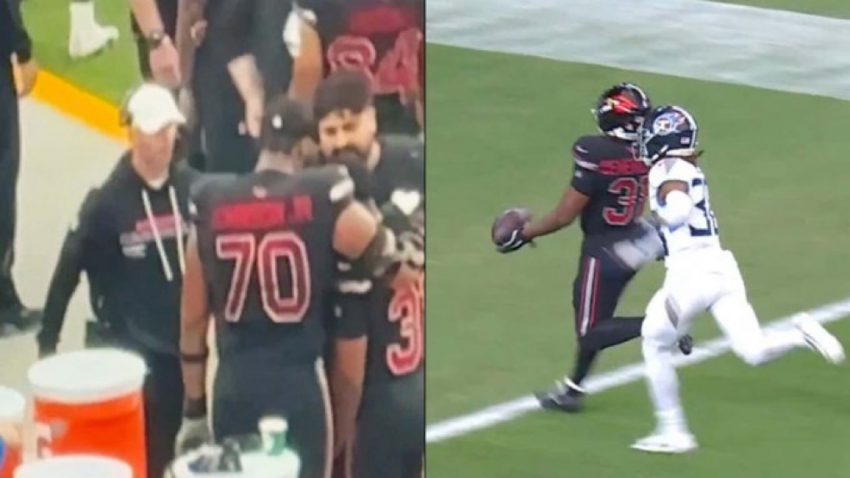In a rare and controversial move, Arizona Cardinals head coach Jonathan Gannon has been fined $100,000 by his own team following a heated sideline altercation with running back Emari Demercado. The incident, which occurred during the Cardinals’ 20-17 loss to the Tennessee Titans on October 5, 2025, has sparked widespread debate about NFL coach conduct, player accountability, and the evolving standards of sideline behavior. Let’s dive into the details of this unprecedented fine, its context, and what it means for the future of the league.
What Happened During the Cardinals vs. Titans Game?
The altercation stemmed from a critical moment in the fourth quarter of the Cardinals’ game against the Titans. Emari Demercado appeared poised to score a 72-yard touchdown, a play that could have extended Arizona’s lead to 28-6. However, the running back dropped the ball just before crossing the goal line, resulting in a touchback that handed possession back to Tennessee. This costly mistake triggered a monumental collapse, with the Titans staging a comeback to secure a last-second victory.
Sideline footage captured Gannon berating Demercado in a highly charged exchange, an interaction that quickly went viral. The Cardinals’ internal review deemed Gannon’s reaction excessive, leading to the substantial $100,000 fine—the first of its kind imposed by a team on its head coach for a player altercation.
Gannon’s Fine: A Historical Precedent
This incident marks the first time an NFL head coach has been fined by his team for a sideline confrontation since Tampa Bay Buccaneers coach Bruce Arians was penalized $50,000 by the league in January 2022. Arians had swiped at safety Andrew Adams’ helmet during a playoff game against the Philadelphia Eagles, an action the NFL deemed below the standards expected of a head coach.
While the NFL has not imposed additional league-wide discipline on Gannon, the Cardinals’ decision to self-regulate underscores a growing emphasis on maintaining professionalism and accountability on the sidelines. Gannon has since issued a public apology, acknowledging his overreaction while praising Demercado’s overall contributions to the team.
The Context: A Game Defined by Mistakes
The Demercado fumble was not the only blunder that cost the Cardinals the game. Later in the match, defensive back Dadrion Taylor-Demerson intercepted a pass but fumbled the ball into the end zone, where Titans receiver Tyler Lockett recovered it for a touchdown. These errors, combined with the Titans’ final drive, turned a potential Cardinals win into a historic loss—the third consecutive game Arizona has dropped on the final play of regulation.
The pressure of such a high-stakes moment likely fueled Gannon’s emotional response, but the fine suggests the Cardinals are prioritizing team cohesion over public displays of frustration.
Reactions from Fans and Analysts
The X posts surrounding Adam Schefter’s breaking news reveal a divided fanbase. Some, like @mccaffreyformvp, argue that Gannon “deserved” the fine, viewing his outburst as unprofessional. Others, including @YoureFiredSir and @DannyBagsZ, defend the coach, asserting that he did nothing wrong and that coaches should have the authority to hold players accountable. Critics like @Weavooo and @good3n have labeled the NFL a “soft league,” suggesting the fine reflects an overcorrection in disciplinary policies.
This polarization highlights a broader conversation about the balance between discipline and decorum in professional sports, a topic that continues to evolve as the league adapts to modern expectations.
What This Means for the Cardinals and the NFL
The internal fine, while significant, does not appear to signal the end of Gannon’s tenure. However, some fans, such as @Official_SammyE, have speculated that this incident could lead to his dismissal by January if the team’s performance doesn’t improve. Others, like @loganbrggs, suggest the fine reflects poorly on the Cardinals’ organization rather than Gannon alone, pointing to a lack of internal support.
For the NFL, this case sets a potential precedent for how teams and the league handle coach-player conflicts. As sideline interactions are increasingly scrutinized—thanks to high-definition broadcasts and social media—the pressure to maintain a positive public image may lead to stricter guidelines in the future.
Looking Ahead: Accountability and Leadership
Jonathan Gannon’s apology and the Cardinals’ swift action demonstrate a commitment to accountability, even at the coaching level. Demercado, despite the mistake, remains a key part of the team’s offensive strategy, and Gannon’s public support for him suggests an intent to move forward constructively.
As the 2025 season progresses, all eyes will be on the Cardinals to see how this incident impacts team morale and performance. For NFL fans, this episode serves as a reminder of the high stakes and emotions involved in professional football—and the fine line coaches must navigate between motivation and misconduct.


